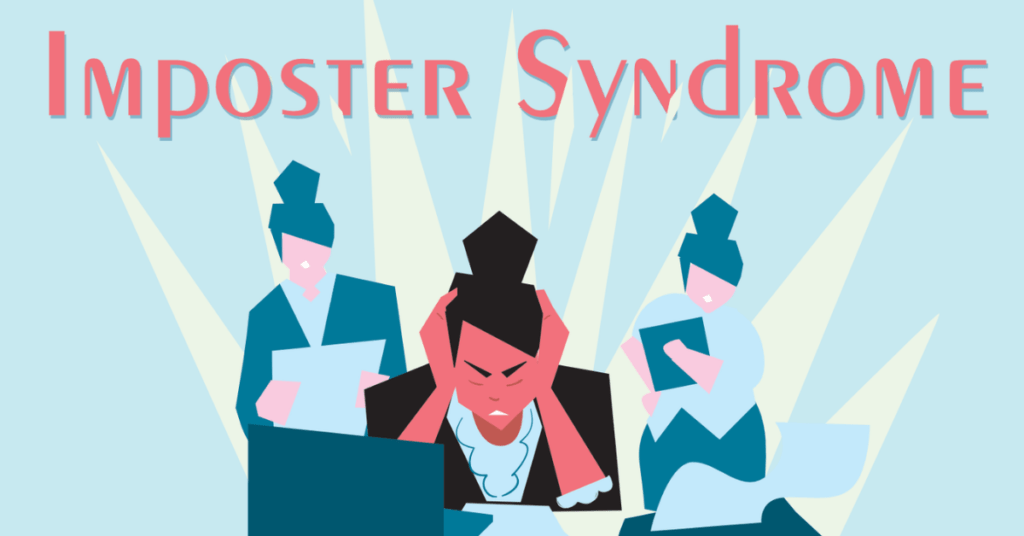Imposter syndrome is a serious issue that affects many people. As much as 75% of the population will experience it at some point in their lives, and it can have lasting effects on them psychologically. This blog post discusses how imposter syndrome develops, what its symptoms are, common causes of the condition, and how you can start to solve this problem for yourself or someone close to you today.
Contents
What Is Imposter Syndrome?
 Imposter syndrome helps to describe a feeling of inadequacy and self-doubt that often affects people in high-achieving professions. Individuals with this syndrome constantly worry that they are not good enough and that they will be exposed as frauds. This can lead to feelings of anxiety and depression, and can seriously hamper a person’s performance and personal life.
Imposter syndrome helps to describe a feeling of inadequacy and self-doubt that often affects people in high-achieving professions. Individuals with this syndrome constantly worry that they are not good enough and that they will be exposed as frauds. This can lead to feelings of anxiety and depression, and can seriously hamper a person’s performance and personal life.
Sometimes people confuse this syndrome with the Dunning-Kruger effect. It is actually a type of cognitive bias.
Symptoms of Imposter Syndrome

There are some common symptoms of this syndrome. Some of these are:
Anxiety
Anxiety can be a sign that you are feeling out of your depth. If you are experiencing a lot of anxiety, it might be an indication that you are not confident in your abilities and feel like a fraud.
Depression
Depression is also common among people with imposter syndrome. It can be caused by feelings of worthlessness and inadequacy, which are common among those with this syndrome.
Inability to Accept Praise
People with imposter syndrome often have difficulty accepting praise from others. This is because they don’t believe that they deserve the accolades that they receive and worry that any success is due to luck or chance rather than their own abilities.
Perfectionism
People with imposter syndrome often have high standards for themselves and for others. This can be a good thing, but for those with imposter syndrome, it often leads to feelings of disappointment and failure because they are unable to meet their own standards.
Self-Doubt
Self-doubt is a major component of this syndrome. People with this syndrome constantly worry that they are not good enough.
Sabotaging Success
People with imposter syndrome often sabotage their own success. This is usually done in an attempt to prove that they are not actually competent or capable.
Causes of Imposter Syndrome

There are many causes of imposter syndrome. Some of the most common ones are:
Fear of Failure
People with imposter syndrome often fear failure. This can be because they are afraid that they will not be able to meet their own high standards or because they are worried about what other people will think if they fail.
Negative Self-Talk
People with imposter syndrome often engage in negative self-talk. This is where they criticize themselves and put themselves down.
External Pressure
Some people develop imposter syndrome due to external pressure from others. For example, a parent might push a child to succeed academically or a boss might expect employees to work long hours.
Lack of Confidence
Some people develop this syndrome due to a lack of confidence. This might be due to low self-esteem or insecurity. This lack of confidence can lead to feelings of self-doubt and inadequacy.
Upbringing
People might develop imposter syndrome due to their upbringing. This can be because they were taught not to show any weaknesses and that it is wrong to fail at anything. They might also have been criticized too harshly when they failed or made a mistake as children, which has led them to believe that making mistakes and failing is unacceptable.
Impact of Imposter Syndrome

There are many ways in which imposter syndrome can impact a person’s life. Some of these are:
Performance
People with this syndrome often perform below their abilities. This is because they don’t believe that they are capable and doubt their own skills.
Creativity
Imposter syndrome can also impair creativity. This is because people with this syndrome are often afraid to take risks and experiment, for fear of being exposed as a fraud.
Relationships
Imposter Syndrome can also have an impact on relationships. People with this syndrome might be less likely to socialize or networking, for fear of being found out. They might also be less likely to trust others and more likely to feel insecure in relationships.
Career
People with this syndrome often have difficulty advancing in their careers. This is because they don’t believe that they are good enough or that they deserve success. They might also be less likely to take risks and more likely to doubt their abilities.
Mental Health
Imposter Syndrome can also lead to mental health issues such as depression, anxiety, and low self-esteem.
Prevalence of Imposter Syndrome
Imposter syndrome is a fairly common phenomenon. It has been estimated that between 70% and 80% of people will experience it at some point in their lives. However, it is most commonly seen in high-achieving women who feel like they are not good and constantly worry about being exposed as a fraud. This is also more common in people who are young and transitioning into a new role or environment.
Diagnosis of Imposter Syndrome

A mental health specialist helps to diagnose this syndrome. This might be someone who works in private practice or at an academic institution, such as a psychologist, psychiatrist, counselor, etc. The diagnosis of this condition will involve the assessment of symptoms and whether they are currently impacting your life.
Treatment for Imposter Syndrome
There are many different ways to treat imposter syndrome. Some of these are:
CBT
Cognitive-behavioral therapy (CBT) helps to treat this syndrome. This involves working with a therapist to identify and challenge the negative thoughts and beliefs that are fueling your symptoms.
Self-Care
It is important for people with this to engage in self-care activities. This might include things like exercise, relaxation techniques, journaling, etc.
Support Groups
There are also support groups available for people with this syndrome. This can be a great way to connect with others who understand what you’re going through and get advice and support from them.
Medication
In some cases, medication may also help to treat imposters. This will usually be prescribed by a psychiatrist and might include antidepressant or anti-anxiety medications.
How To Deal With Imposter Syndrome

If you think you might be struggling with this syndrome, there are some things that you can do to deal with it.
Talk to Someone
Talking about your feelings can be helpful in managing them. If you feel like you can’t talk to family or friends, consider talking to a therapist or counselor who can help you manage your symptoms.
Challenge Your Negative Thoughts
One way to combat self-doubt and negative thoughts is to challenge them head-on. When these thoughts come into your mind, ask yourself why you believe them and what evidence you have to support them.
Take Risks
People with this syndrome are often reluctant to take risks for fear of being exposed as a fraud. However, it is important to remember that mistakes are part of the learning process. Trying new things can help you grow and learn more about yourself.
Seek Support
There are many different types of support available for people with imposter syndrome. This might include talking to someone who understands what you’re going through or joining a support group.
Conclusion
Imposter Syndrome is a common phenomenon that can have a significant impact on your life. If you are experiencing any of the symptoms listed above, it is important to seek help from a mental health specialist. There are many different treatment options available, so there is sure to be one that will suit your needs. Remember, you are not alone and there is support available for you.
If you are looking for affordable Online Counseling MantraCare can help: Book a trial therapy session


